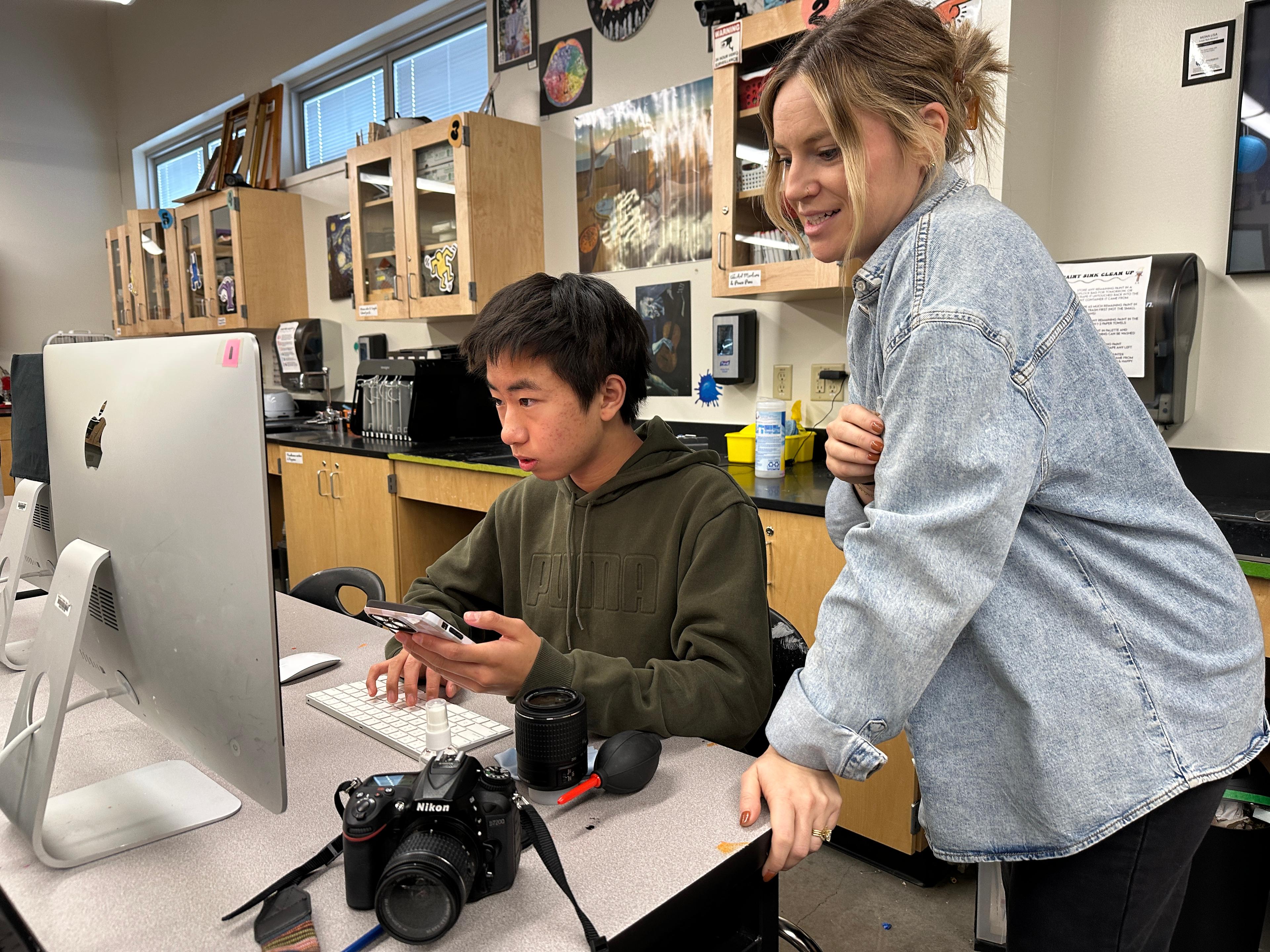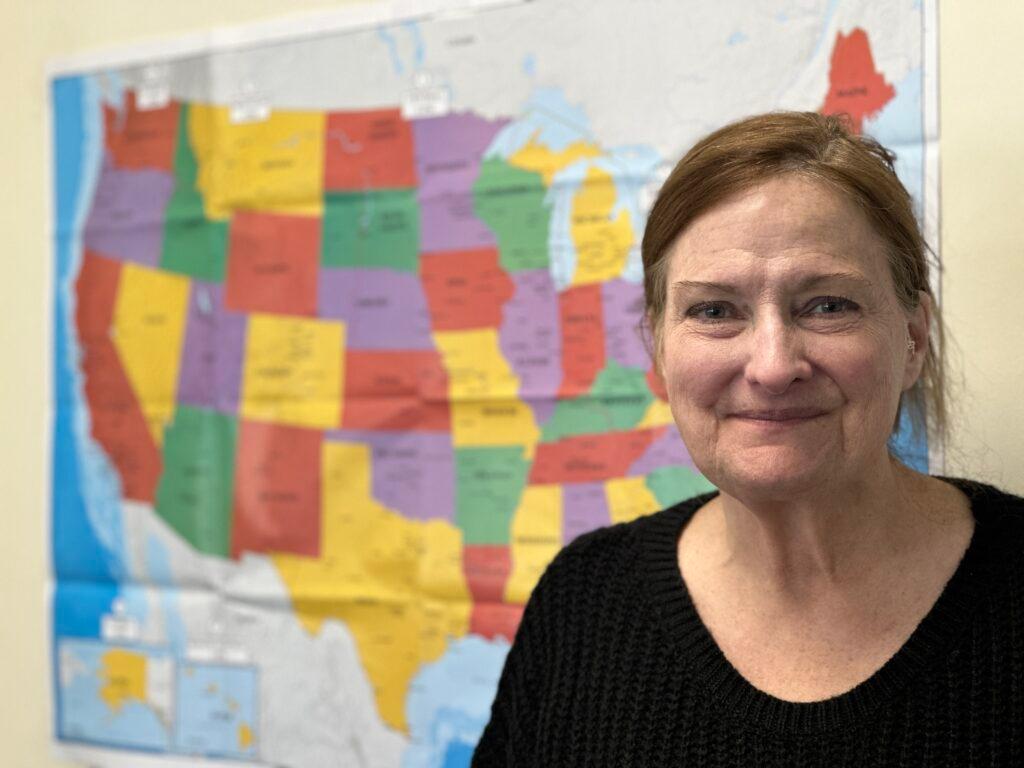
More Colorado schools and districts are banning the use of phones in school. Boulder and Grand Junction are the latest major school districts to do so.
Multiple studies have linked excessive teen phone use to anxiety, depression, sleep disturbance and feelings of loneliness. CPR first reported on the issue in-depth in 2019. In classrooms, many teachers report phones are a major source of distraction that leads to less learning. As algorithms become more sophisticated, teen phone addiction has only exacerbated.
Many teachers applaud the recent school bans, but others see specific uses for phones in schools. CPR education reporter Jenny Brundin spoke with two teachers about their observations on phone use in school.
Editor’s note: Interview transcripts have been edited for length and clarity.
Margaret Motz, substitute high school teacher after teaching for 35 years:

Margaret Motz: I believe that phones are the biggest hindrance to learning I've ever seen before in all these years. Especially the last five or six years, students are constantly engaged with their telephone, whether it's in their hand or not. The main thing on their mind is their phone. They're not engaged in the learning process. They might appear to be engaged, but I can promise you that they're thinking about what's on their phone more than what's happening in class.
I strongly support some type of rule of no telephones, no cell phones in school. They need to learn to communicate with each other again in person and not through texting, learn to speak to strangers and kids that they don't know, get to know other students, get to know their teachers, have fun, laugh and joke, and they can't do that when they're constantly watching videos or texting with other people.
Jenny Brundin: That's really interesting, that last observation about joking spontaneously and talking to other kids. So, do you actually see they're struggling with those skills?
Motz: Yes, because they're watching things that are funny and laughing but they are not the ones making the joke. They're not the ones engaged in telling a funny story, having fun with other people without a phone as the medium.
Brundin: … Sort of coming up with the original ideas and original content …
Motz: Exactly. And they say, you know, ‘Oh, Miss Motz, look at this, look at this,’ and I say, I don't want to look at someone else living their life. I want to live this life with you right here right now.
Brundin: You also said something interesting earlier before we started taping about when they get up to go to the bathroom. Let's say they're in a class that has one of those yonder pouches where they place their phones at the front of the class. If they head out to use the bathroom during class, what do they do?
Motz: They have to get their phone before they go to the bathroom and I'll say, ‘Why do you have to take your phone with you to the bathroom? You know, you don't need it!’ But they have gone now half an hour without checking their phone and they have to check it to see what happened or who texted them or who sent them like a Snapchat or TikTok. It reminds me of an addict, you know, ‘jonesing’ for their fix.
If they could just check their phone in at the beginning of the day — they won't be able to look at it for 7.5 hours or maybe they can look at it at lunch, I don't know— but once they got used to it, it would change their world. It would change their learning experience, living in the moment.
Brundin: When you think back to when you taught 15, 20 years ago and the amount of curriculum you'd get through in one class, what was it like compared to now?
Motz: The amount of content that we teach now is probably fractions of what we were able to do back when I first started teaching. For example, we would cover 12 chapters in a book. Now we're lucky if we get two chapters in the book. We don't use textbooks like we used to, but that's just an example. You have to go so much slower. You have to teach in every different way and you're constantly competing for attention and then when you check for understanding it's not happening it's not happening in the same way it used to.
Brundin: So, your theory or what you're observing is not only do you think that maybe their minds are elsewhere and therefore you're having to go over it again and again, but also do you think that they're just, how can I say this, not as sharp somehow or is it more of a distraction?
Motz: I think distraction is a good word, but I also think they're not used to personally engaging and not having this constant other thing on their mind.
Brundin: I'm wondering if students are spending 7 hours and 20 minutes a day on average on their phones outside of school for entertainment purposes, do you think it's having an impact on their ability to do math at a particular level or their ability to read at grade level?
Motz: Most definitely. I applaud school districts and even states who have implemented a ban on phones during the school day. I think the level of learning will increase immensely after we have eliminated that distraction in schools. I'm a substitute. When I go into a classroom where the teacher has a clear rule — no phones, absolutely no phones — it's a much better lesson, it's a much better environment — so much discussion and learning goes on versus when I'm in a classroom where the teacher doesn't really care if they have their phones or not, it’s a constant battle, a constant battle. If I say ‘Put your phones away’ they feel like they have a right to have their phone and I as a substitute don't have a right to tell them to put it away.
Brundin: So, it varies by school?
Motz: Yes, by classroom. One other thing I want to point out, (after) this latest school tragedy I heard parents saying, ‘You see this is why we need to have phones in school so our kids can communicate with us.’
But first of all — and I'm going to sound old — you shouldn't be on your phone talking to your parents or texting your parents during an emergency. You should be following the emergency protocol. And they say, ‘Oh but I need to tell them I love them.’ Tell them you love them every day before you leave so that that's not something you're thinking about in the case of an emergency and if you absolutely need to get in touch with your student, it is absolutely possible to do so.
Brundin: You’re finding some of the pushback (to banning phones) might be from parents?
Motz: Oh yes, I think so. So many times, that's who's texting with kids. ‘Oh, my mom is texting me for this or for that or for this or for that.’
Let go. Let go! I just look at these kids that have parents that track their every moment.
No!
Haley Nelson, Denver high school teacher

Brundin: Your school has a clear no-phones policy. But as an art teacher, you lobbied for permission to use the phone in very specific circumstances. First, tell me about that space on your desk if students aren’t following the rules you lay out for the phone.
Nelson: I have a phone spa on my desk! The phone goes to get some ‘rest and relaxation’ in the spa. Of course, having to be sympathetic to kids having needs or something going on (in their lives), I'll try to lean in with care first. I'm not going to reach out my hand to take their phone but instead asking, ‘Is everything OK? Why do you need it out?’ If I see that they're scrolling on the “things,” I'll just ask them kindly to put it in the box themselves. I try my best to not take anything, you know one of the things they care about the most in the world is being grabbed from them. They hate that.
Brundin: So, you teach art, which includes digital art. Tell me briefly, how do you use phones in digital art class?
Nelson: I would say at my school I definitely have a very interesting policy compared to other people. I actually really value the use of phones. We really do need them in many ways. I teach digital art, which includes digital photography, and the greatest camera that they have in their pocket is their phone. So, we do integrate phones a lot into my class through the curriculum and there's some other needs for it as well.
Brundin: Could you just talk just a little bit about that? How do you use phones?
Nelson: Aside from when we're in photography class and they obviously need their phone to take the pictures directly, there's so much power in the resource of their phone in art class. Many of our students want to find ideas from the internet. Pinterest is blocked on their school computer. They use their phone for it, and I am so happy to allow them to do that.
We usually just have a time period where they're allowed to be on it, or they can ask if they can be on Pinterest. Just having open communication so that I can assume the best intent of what they're using their phone for.
Oftentimes I will have students go research on Instagram to find some of our digital photographers. We actually had students reach out to local photographers in my photography class through Instagram. And that was really cool to connect with people. And the very biggest one I use it for is reference photos. They need a reference photo for everything and so they'll start gathering photos that they took or photos that they find on their phone, and I do try to get them to move them over to their computer so they're not looking at their phone for the entirety of an art project.
Brundin: You found it helped to have them email the photos they're using to their laptop because I think you found if they just did (the entire project) on their phone, there was a tendency to wander.
Nelson: Absolutely. Even when they're doing a short amount of research, there's some scrolling, a Snapchat pops up, a text, so they will find their pictures in that set amount of time to do research and then they'll need to send it to themselves on their school computer to access to use it.
Brundin: You see a pretty powerful connection between music and art, and you've worked out a way that sometimes students can listen to music on their phones, you know, tell me about that.
Nelson: Art and music are so integrated into each other. I did actually struggle for a while — our school policy has rationale. I totally respect it. But music and art are so integrated into each other and it’s how students connect with themselves. And when they connect with the music they can connect with the work that they're making and they actually are so much more keyed into what they're creating when they can get into their own comfort zone with music.
I actually find that the days that I allow students to have a full class period to work on their art and have music are some of the days I have the least classroom management issues. Kids are in the zone, they feel more centered in their own connection. And they're actually able to provide some of the best days of work when they can listen to music.
There's so much value in speaking to their peers and connecting but sometimes there's days where kids just need to have a class period to get into their artwork and their music and be in their own space. And so my students get to earn free music Fridays. If I haven't collected any phones for misuse that week, they can have free music Fridays. They get to sit by whoever they want and listen to music as well. And
I've found that that incentive makes them feel like there is some ownership and some trust in being allowed to have those things, but when it's earned, not just assumed.
Brundin: Let's talk for a minute about the not so beautiful part of phones and the balance. Even when they have access to music or looking at photos for reference, talk to me about how frequent it is that they become distracted.
Nelson: It’s definitely a slippery slope. I have to kind of accept that when they have those times to do research or find pictures, I have to have really, really clear guidelines like these are the things you cannot be on. If I do find that a student is scrolling on TikTok when they're supposed to be researching images, I have tried to have really clear expectations — I will still collect your phone right now and now you don't have that as a resource.
If you give it to them too often, you're not going to have as much control. They're going to feel like they get it all the time. Rather than being earned, they start to feel like, oh, we get it all the time.
So, having really, really clear expectations and holding a boundary so that it doesn't feel like you have unclear expectations and now they're upset because they don't realize why it's being taken away.
Brundin: How would you describe students' relationship with phones, for those in our audience perhaps who don't have teenagers or who are not teachers, how would you describe it?
Nelson: It is interesting and it is tough. It's interesting because I'm on my phone a lot. I have two small businesses. I use my phone for personal reasons. I definitely empathize with how much they value their phones, but it's definitely interesting because they grew up with them. They feel so attached. If you try to take a phone without kind of empathizing and feeling what a student feels, they feel like you have taken one of the most precious things that they have, their biggest connection to what they believe is their world.
It is very interesting and it gets tougher each year —because they are so attached to their phones—to figure out where the balance is. As I teach longer, I realize each year I have to adapt my own understanding because they have a different relationship with their phone than I do or I could even understand.
Brundin: You are a younger teacher. Do you sense that there is a generational divide amongst teachers regarding how they view phones?
Nelson: I think every teacher of any age sees the value in students not being attached to their phones, but I do see that. At my school, we definitely have a younger staff. I'm actually probably middle of the road in age at the age of 31. So, we have a much younger staff, but I think everyone sees the value in that we want students to feel detached from their phone and have their own learning and being present. But I do see that some of our older staff members definitely are wanting to stray away from technology even more — that includes phones, computers. They want to make it feel more authentic and present versus being attached to technology.
I think our school does a really good job of trying to keep up with the 21st century and saying there's actually a ton of reasons why we might need our phones in these specific times and … also see why we think students shouldn't have them all the time.









